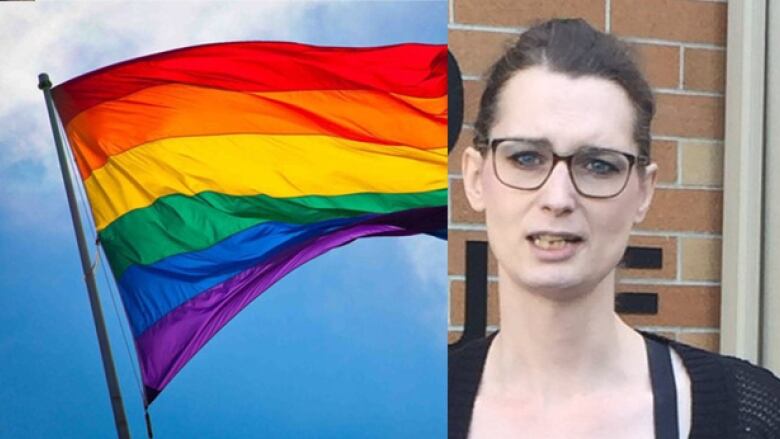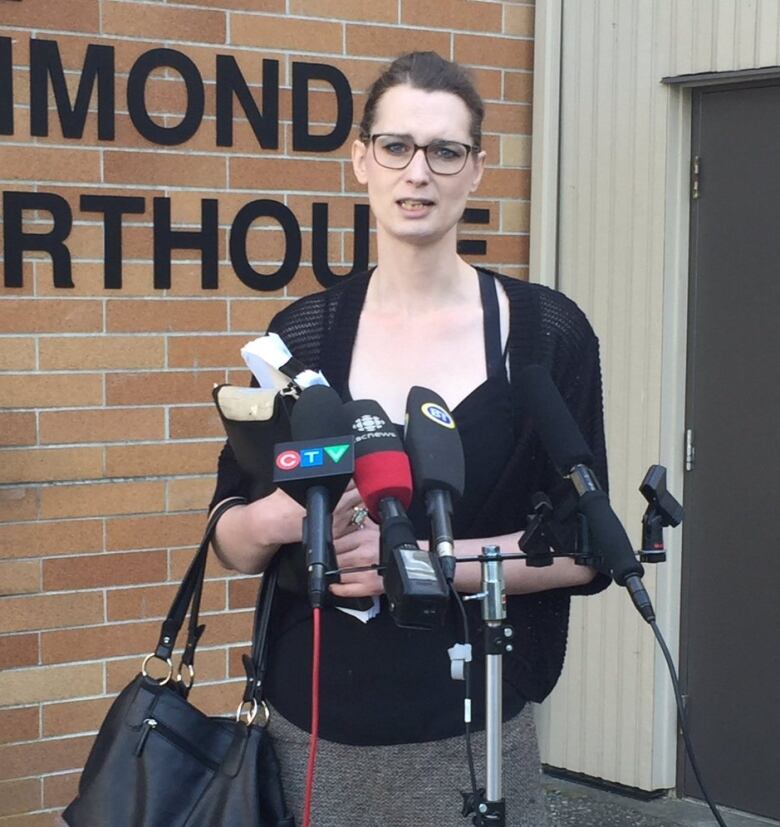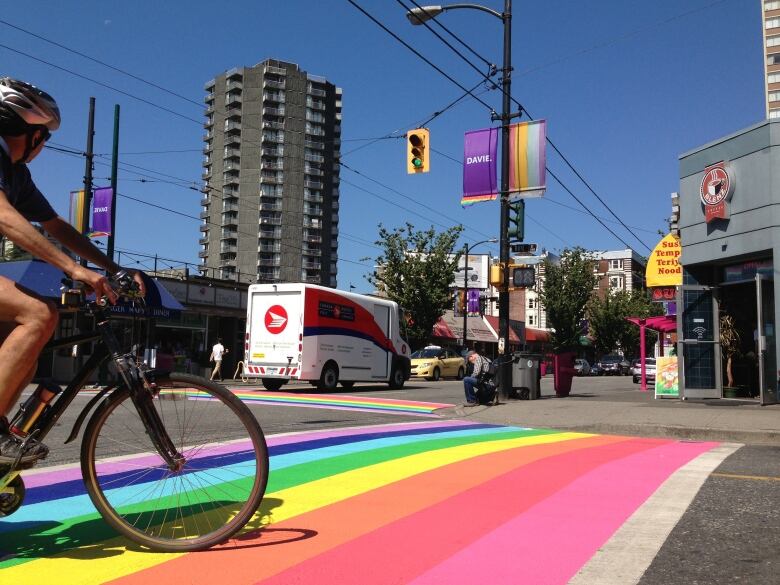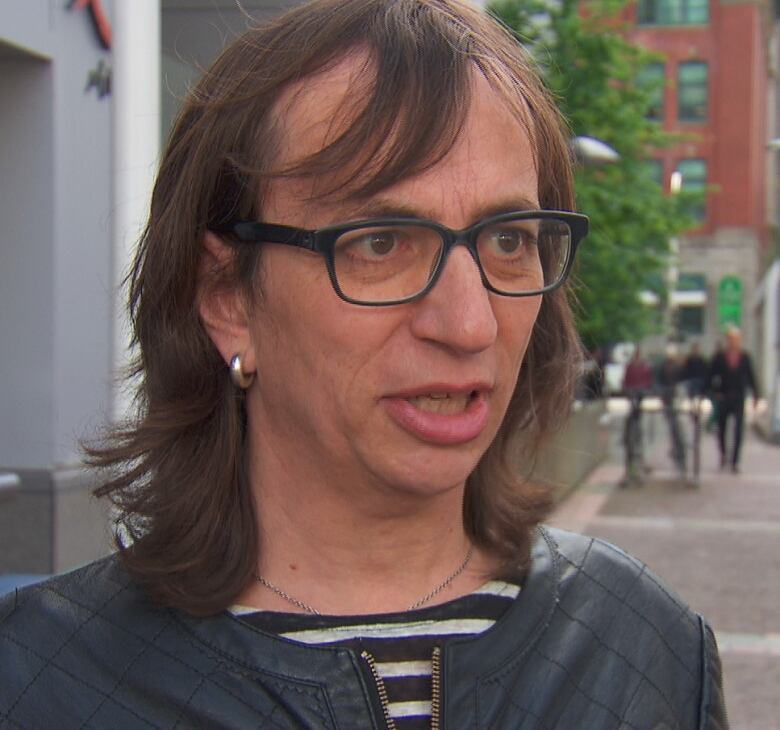UBC student Brooklyn Fink explains why she burned the pride flag on campus
Fink, 31, is transsexual and calls the rainbow pride flag an 'offensive' and non-inclusive symbol

The University of B.C. student charged with mischief for allegedly burning a rainbow LGBT pride flag at the university last February says she did it to protest what she considers an "offensive" symbol.
Brooklyn Marie Fink, 31, who istranssexual, talked about the flag burning after her first court appearance in Richmond on Tuesday.
"As a media artist, I intended in burning the flag only to illustrate my displeasure at the university's failure to come to an agreement on the fact of the flag's offensiveness."
- Mischief charge laid in UBC Pride flag burning
- Pride flag flies in solidarity at City of Vancouver after UBC flag burning
- UBC pride flag burned during OUTweek
"[The burning] was met with hate and prejudice rather than critical self-reflection, so this has been a learning experience for me."
The flag had been raised Feb. 5 near the university's old Student Union Building, at the opening ceremony of OUTweek, which is described by UBC as "an annual celebration of gender and sexual diversity" organized by the Pride Collective at UBC, a student club.
When it was discovered burned Feb. 9, the act was viewed as a possible hate crime, prompting extra security precautions and the cancellation of a parade in support of transgender people.

'Really emotional, really stressful'
Fink told CBC she does not feel included in theLGBT label an abbreviation used to cover a range of non-gender-conforming identities, which often stands for lesbian, gay, bisexual and transgender.
Finkdraws a distinction between identities based on what gender someone is attracted to versus what gender someone identifies as.
UBC's OUTweek is explicit in its intention to include transsexual and transgender people in its events, including the rainbow pride flag raising, but Fink didn't see it that way.
"The university's flag is the flag of inclusion of the whole university. And when you take it down and you put up an exclusive flag that only represents [a small proportion] of the population, then you are sharing your hegemony over the university," she said.
Fink said the rising awareness about transgender people has made life more difficult for her, something she finds "really emotional, really stressful" to talk about.
"Ten, 12years ago I was just a tall woman and nobody thought anything of it," she said.
"But because these gender nonconformers are being so loud and proud ... now everybody looks and they can see oh, that tall woman with a deep voice, maybe she's a dude."

'No excuse' says activist
The rainbow pride flag, sometimes called the LGBT pride flag or gay pride flag, was created in 1978 by San Francisco artist Gilbert Baker, who has said he wanted to make a positive and diverse symbol for the gay community.
It's become widelyadopted, not just for pride parades but also political statements, with some Canadian cities flying the rainbow flag during the 2014 Sochi Olympics to protest Russia's anti-gay laws. Vancouver's West End neighbourhood boasts permanent rainbow crosswalks, painted by the city in 2013.
- Trudeau kicks off campaign at Vancouver Pride Parade
- Rob Ford continues protest against rainbow flag at city hall
However inclusive rainbow flag-wavers might intend to be the reality can be more complex, said transgender-rights activist Morgane Oger.

"Transsexual people do struggle with being marginalized within the LGBT community," said Oger, chair of Vancouver's Trans Alliance Society. ("Transsexual" describes transgender people who have undergone medical treatment, such as hormone therapy or surgery, said Oger.)
One tension is between people who want to celebrate being out, and those who have lived for years in fear of being outed, said Oger.
However, Oger said that "is no excuse" to burn the pride symbol, which she calls an "act of hatred."
"This woman, she set fire to a flag, and she set off this gigantic uproar, that everybody across Canada thought some hater somewhere was coming after us again," said Oger.
"And it turns out that no, it was a trans person who was really unhappy about not being heard."
Fink faces possible expulsion
Fink said she was suspended by the university when she was identified as a suspect, and is awaiting a non-academic misconduct hearing to see whether she will be expelled.
In court today, she asked a justice of the peace to dismiss the mischief charge against her, saying it was being dealt with by the university. That request can only be heard by a judge, she was told.
Fink's next court date is May 17.
Updates:
- The charge of mischief under $5,000 laid against Brooklyn Fink was stayed on December 6, 2016.
- The language in this story has been changed to clarify gender issues.












_(720p).jpg)


 OFFICIAL HD MUSIC VIDEO.jpg)
.jpg)



























































































